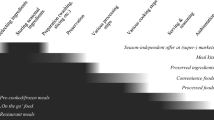Abstract
I consider Paul Thompson’s Agrarian Vision from the perspective of the philosophy of technology, especially as it relates to certain questions about public engagement and deliberative democracy around food issues. Is it able to promote an attitudinal shift or reorientation in values to overcome the view of “food as device” so that conscientious engagement in the food system by consumers can become more the norm? Next, I consider briefly, some questions to which it must face up in order to move closer in dismantling the barriers that inhibit the capacity for virtuous caretaking of the food system at various levels. Lastly, and more deeply, how successful might agrarianism be in inculcating citizenship values (ones that go beyond food ethics as a private affair), for the democratization of agricultural technologies? Might the Jeffersonian foundation to which the agrarianism (a la) Thompson appeals need something like a contemporary theory of justice in order to facilitate the reconstitution of our politico-moral selves? How can it help guide appropriate ruminations on the intra and intergenerational question, “What do we want the shape of our current and future social and political institutions to look like in relation to food?”
Similar content being viewed by others
Notes
Communities enjoy food security in a thicker sense when its people, at all times, have access to nutritious, safe, personally acceptable, and culturally appropriate foods obtained through normal food distribution channels that is not the food bank or like avenues (Allen 1999). See also Poppendieck (1997).
For further discussion of some of these costs please see Food and Agriculture Organization of the United Nations (FAO) (2009). The State of Food and Agriculture 2009: Towards a Responsible Livestock Future; Steinfeld et al. (2006). Livestock's Long Shadow: Environmental Issues and Options. Food and Agriculture Organization of the United Nations (FAO). Rome.
References
Allen, P. (1999). Reweaving the food safety net: Mediating entitlement and entrepreneurship. Agriculture and Human Values, 16, 117–129.
Beekman, V. (2008). Consumer rights to informed choice on the food market. Ethical Theory and Moral Practice, 11, 61–72.
Berry, W. (2002). How we grow food reflects our virtues and values. In G. Pence (Ed.), The ethics of food: A reader for the 21st century (pp. 12–43). Lanham, MA: Rowman and Littlefield Publishers.
Berry, W. (2009). Bringing it to the table: On farming and food. Berkeley, CA: Counterpoint.
Borgmann, A. (1984). Technology and the character of contemporary life: A philosophical inquiry. Chicago: University of Chicago Press.
Borgmann, A. (1992). Crossing the post modern divide. Chicago: University of Chicago Press.
Borgmann, A. (2006a). Real american ethics: Taking responsibility for our country. Chicago: University of Chicago Press.
Borgmann, A. (2006b). Feenberg and the reform of technology. In T. Veak (Ed.), Democratizing technology: Andrew feenberg’s critical theory of technology (pp. 101–111). NY: SUNY Press.
Buller, H. (2010). Palatable ethics. Environment and Planning A, 42, 1875–1880.
Food and Agriculture Organization of the United Nations (FAO). (2009). The state of food and agriculture 2009: Towards a responsible livestock future. Rome. http://www.fao.org/docrep/012/i0680e/i0680e.pdf.
Heidegger, M. (1977). The question concerning technology and other essays (trans: William Lovitt). New York: Harper and Row.
Ilea, R. C. (2009). Intensive livestock farming: Global trends, increased environmental concerns, and ethical solutions. Journal of Agricultural and Environmental Ethics, 22, 153–167.
Pollan, M. (2006). The omnivore’s dilemma a natural history of four meals. New York: Penguin Press.
Poppendieck, J. (1997). The USA: Hunger in the land of the plenty. In G. Riches (Ed.), First world hunger: Food security and welfare politics. London: MacMillan.
Singer, P., & Mason, J. (2006). The ethics of what we eat: Why our food choices matter. USA: Rodale Inc., Holtzbrinck Publishers.
Steinfeld, H., Gerber, P., Wassenaar, T., Castel, V., Rosales, M., & de Haan, C. (2006). Livestock’s long shadow: Environmental issues and options. Rome: Food and Agriculture Organization of the United Nations (FAO).
Thompson, P. B. (1993). Animals in the agrarian ideal. Journal of Agricultural and Environmental Ethics, 6(Special Supplement 1), 36–49.
Thompson, P. B. (1995). Spirit of the soil: Agricultural and environmental ethics. London, NY: Routledge.
Thompson, P. B. (2000). Thomas Jefferson and agrarian philosophy. In P. B. Thompson & T. C. Hilde (Eds.), The agrarian roots of pragmatism (pp. 118–139). Nashville: Vanderbilt University Press.
Thompson, P. B. (2001). Reshaping Conventional agriculture: A north american perspective. Journal of Agricultural and Environmental Ethics, 14(2), 217–229.
Thompson, P. B. (2006). Commodification and secondary rationalization. In T. Veak (Ed.), Democratizing technology: Andrew Feenberg’s critical theory of technology (pp. 112–135). Albany, NY: SUNY Press.
Thompson, P. B. (2008). The ethics of intensification: agricultural development and cultural change (The International Library of Environmental, Agricultural and Food Ethics). Utrecht, The Netherlands: Springer.
Thompson, P. B. (2010). The agrarian vision: Sustainability and environmental ethics. Lexington: The University Press of Kentucky.
Wright, W., & Middendorf, G. (Eds.). (2008). The fight over food: Producers, consumers, and activists challenge the global food system. PA: Pennsylvania State University Press.
Author information
Authors and Affiliations
Corresponding author
Rights and permissions
About this article
Cite this article
Anthony, R. The Ethics of Food for Tomorrow: On the Viability of Agrarianism—How Far can it Go? Comments on Paul Thompson’s Agrarian Vision . J Agric Environ Ethics 25, 543–552 (2012). https://doi.org/10.1007/s10806-011-9339-x
Accepted:
Published:
Issue Date:
DOI: https://doi.org/10.1007/s10806-011-9339-x




